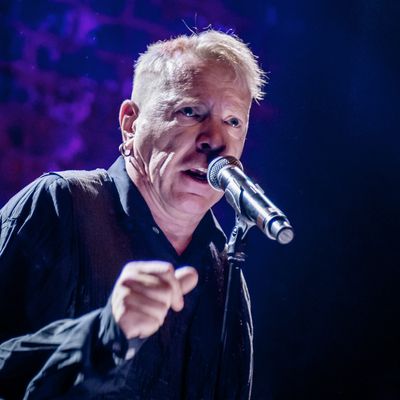
As the sneering face of the Sex Pistols, John Lydon was — and remains — one of the most iconic faces of musical dissent. Though the Pistols in their most famous incarnation only lasted from 1975 to 1977, Lydon’s career as a musical gadfly continued on in rewardingly unpredictable fashion with his long-running band, Public Image Ltd, and as an impish public figure, appearing, among other places, on the British reality show I’m a Celebrity … Get Me Out of Here! Next up is an annotated collection of his lyrics, Mr. Rotten’s Songbook, which will be published on March 31 and which functions as a comprehensive primer on a lifetime spent taking shots at the Establishment.
The ever-pugnacious Lydon, 61, spoke on the phone from his home in Los Angeles about those two subjects, the effectiveness of protest music, and why Trump was a wake-up call.
I know you’ve got the book coming out, but I’d also like to hear your perspective on —
No, first issues first: I’ve put out a wonderful book of all my lyrics. And that took some effort. It all spans from an offer to play in China, and their government needed approval for all the lyrics that to happen. So I had to collect them all, which I hadn’t done before.
Did any lyrics get flagged?
There was no disapproval at all. You know, so much has been said about the Chinese government being very restrictive. I found them to be quite the opposite.
Were you at all disappointed that none of your lyrics got censored?
It did make me question some things: Was anything lost in translation? Did I misspell certain words?
Since this was the first time you’ve gone over your lyrics in a methodical way, what surprised you about your own work?
It surprised me that there I’ve written 127 songs. I of course saw how in the early days I was picking institutions as my targets, and that eventually evolved into attacking myself as well. Self-analysis is the hardest thing to do well.
Given the parallels between when the Sex Pistols started out and now, when there’s again a surge in right-wing nationalism and a bunch of seemingly unfeeling people in positions of political power, do you feel compelled to go back to attacking institutions? Does protest music feel more appropriate than personal music?
Let me put it this way, I’m a folk singer. That’s the truth. It’s important to me to be able to go to bed every night and say, “Another day where I didn’t tell a lie!”
How many nights are you able to say that?
Every night! Except when it’s Irish storytelling time. There’s something in the Irish, we do love a good story.
But wait, just so I’m clear: Calling yourself a folk singer is your way of saying that you make political music? Or does that term mean something else to you?
Let’s be accurate: I’m a folk singer because I’m one of the folks and I write about what affects me as one of the folks and I convey that to other folks. That’s folk music.
I’m going to interpret that as meaning folk music is political music.
I naturally revolt against the system, or as I call it the shit-stem. I don’t like to be told what to do unless it makes sense or is explained to me, and I definitely don’t participate in any of the foolish and childish movements of left-wing or right-wing politics. I just pick out the bits that make sense to me. I won’t support anything wholly, fully, totally, unless I wholly, fully, totally believe it. I don’t need institutions that demand my subservience.
The Sex Pistols had a real, tangible effect on British society in the late ’70s. What’s the key to effective protest music?
Everything you do is effective, one way or the other. My way is to never do anything for money, and to try to sift through situations and find the truth in them. That was an interesting prospect to me then and it’s an interesting prospect to me now.
Do you think England in 1977 was riper for protest or anti-Establishment music than America is in 2017?
I’m not into looking back at specific ideologies. What I do think is that most people these days are not affiliated to a political party; it’s more about individuals and what they think rather than party ideologies, if that answers your question. The ideological goalposts shift much more now than they used to, even for Republicans. Individuals matter more than anything else.
Is a renewed emphasis on the individual how you explain the rise of Donald Trump?
No matter what madness I’m hearing from the podium, he’s thrilling. I’m not for the tomfoolery of believing that a self-interested businessman can solve America’s problems — I don’t see a great sense of empathy or generosity in him — but I’m up for anyone shaking up the jaded world of politicians.
So you’re glad Trump’s in office?
I’m glad people are getting themselves involved in political issues again, whether they’re for him or against him. It’s all about people combining in one glorious fact: We don’t trust politicians. Anything to rattle that lot is for the benefit of mankind. We’ve been dosed and cossetted by loud and mediocre politicians for far too long and now the wake-up call has come and it’s self-determination time. That, to me, is incredibly healthy.
What else positive has come out of Trump’s getting elected?
You know, it’s rejuvenated Saturday Night Live.
This interview has been edited and condensed.

